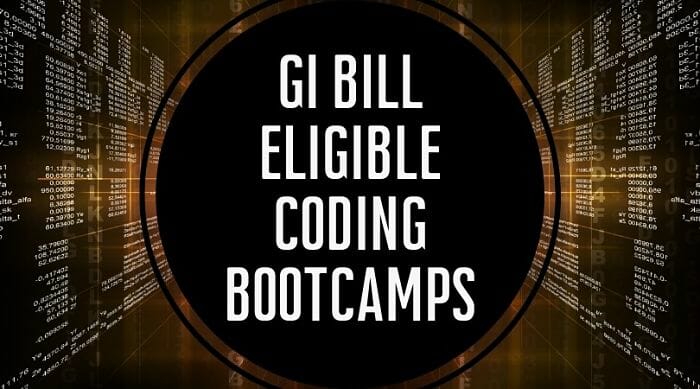Coding bootcamps that accept GI Bill offer veterans a unique opportunity to transition into the high-demand tech industry. These intensive programs provide hands-on training in sought-after skills, preparing graduates for rewarding careers in fields like web development, data science, and cybersecurity.
The GI Bill, a government program designed to support veterans’ education and training, covers a significant portion of the bootcamp’s tuition, making it a financially viable option for many veterans.
Coding bootcamps stand out from traditional computer science programs by offering a faster, more focused learning experience. They emphasize practical skills and real-world projects, allowing students to build a portfolio that showcases their abilities to potential employers. This hands-on approach, combined with the financial support of the GI Bill, makes coding bootcamps an attractive option for veterans looking to embark on a new career path in tech.
Finding Coding Bootcamps That Accept GI Bill
The GI Bill is a valuable resource for veterans who are looking to transition into a new career. Coding bootcamps can be a great way to learn the skills you need to succeed in the tech industry, and many bootcamps accept the GI Bill.
Reputable Coding Bootcamps That Accept GI Bill
Finding a coding bootcamp that accepts the GI Bill is an important step in your career transition. You need to ensure that the bootcamp is reputable, has a strong track record of success, and offers a program that aligns with your career goals.
Want to make a difference in people’s lives? Explore the vast opportunities in social work! There are numerous accredited online schools for social work that can provide you with the education and training you need to succeed in this rewarding field.
- General Assembly– General Assembly offers a variety of bootcamps, including web development, data science, and UX design. They have locations in major cities across the United States, and their programs typically last 12 weeks. The cost of their bootcamps varies, but they accept the GI Bill.
- Flatiron School– Flatiron School offers bootcamps in web development, data science, and cybersecurity. They have locations in New York City, Brooklyn, Seattle, and online. Their programs typically last 15 weeks, and the cost varies depending on the program. They accept the GI Bill.
- Thinkful– Thinkful offers bootcamps in web development, data science, and UX design. Their programs are delivered online, and they have a flexible learning schedule. Their programs typically last 6 months, and the cost varies depending on the program. They accept the GI Bill.
- Hack Reactor– Hack Reactor offers bootcamps in web development. They have locations in San Francisco, New York City, and online. Their programs typically last 12 weeks, and the cost varies depending on the program. They accept the GI Bill.
- Code Fellows– Code Fellows offers bootcamps in web development, data science, and cybersecurity. They have locations in Seattle, Portland, and online. Their programs typically last 12 weeks, and the cost varies depending on the program. They accept the GI Bill.
Factors to Consider When Choosing a Bootcamp
Choosing the right coding bootcamp is a crucial decision that can significantly impact your career trajectory. With numerous bootcamps available, it’s essential to conduct thorough research and consider various factors to ensure you select a program that aligns with your goals and learning style.
If you’re passionate about helping others and want to pursue a fulfilling career in mental health, consider earning an online masters in clinical mental health counseling CACREP. This program can equip you with the knowledge and skills to provide effective counseling services, and the CACREP accreditation ensures that the program meets high standards of quality.
Evaluating Curriculum and Faculty, Coding bootcamps that accept gi bill
The bootcamp curriculum should be comprehensive, covering the latest technologies and industry-relevant skills. You should consider the depth and breadth of the curriculum, ensuring it covers the specific programming languages and frameworks you’re interested in. A strong curriculum should also include hands-on projects and real-world applications to solidify your learning.
It’s also essential to research the bootcamp’s faculty, their experience, and their teaching methodologies. Look for instructors with industry experience and a proven track record of success in teaching coding.
Career Support Services and Job Placement Rates
Coding bootcamps often offer career support services to help graduates transition into the tech industry. These services can include resume and portfolio reviews, interview preparation, and job placement assistance. It’s important to understand the scope of these services and their effectiveness.
You should also investigate the bootcamp’s job placement rates, which indicate the percentage of graduates who secure employment in tech roles within a specific timeframe. A high job placement rate suggests the bootcamp has a strong network and a proven track record of success in placing graduates in relevant positions.
Evaluating Bootcamp Quality and Reputation
Evaluating the quality and reputation of a coding bootcamp is crucial to ensure you’re making a sound investment. Consider the following factors:
- Accreditation and Recognition:Look for bootcamps that are accredited by reputable organizations, such as the Council on Occupational Education (COE) or the Accrediting Council for Independent Colleges and Schools (ACICS). Accreditation indicates that the bootcamp meets specific quality standards and provides assurance of the program’s legitimacy.
- Reviews and Testimonials:Read reviews and testimonials from past graduates to gain insights into their experiences and the bootcamp’s overall effectiveness. You can find reviews on websites such as Course Report, SwitchUp, and Reddit. Look for honest and detailed reviews that provide a balanced perspective.
- Industry Partnerships:Strong industry partnerships can provide valuable networking opportunities and access to potential employers. Look for bootcamps that have partnerships with leading tech companies and organizations. These partnerships can enhance your career prospects and provide you with real-world experience through internships or projects.
Applying to and Enrolling in a Bootcamp: Coding Bootcamps That Accept Gi Bill
Applying to and enrolling in a coding bootcamp can be a great way to jumpstart your career in tech. While it can seem daunting, it’s a process that can be made easier with the right information and preparation.
The Application Process
The application process for coding bootcamps typically involves the following steps:
- Submit an application form: This form usually asks for your basic information, educational background, work experience, and reasons for wanting to attend the bootcamp.
- Take an assessment test: Many bootcamps require applicants to take an assessment test to evaluate their coding skills and aptitude. These tests can vary in format and content, but they often include questions on basic programming concepts, logic, and problem-solving skills.
- Complete an interview: If you pass the initial screening, you’ll likely be invited for an interview. This is a chance for the bootcamp to get to know you better and assess your suitability for their program. Interviews can be conducted in person, over the phone, or online.
- Receive a decision: After the interview process, you’ll receive a decision from the bootcamp. If accepted, you’ll be given instructions on how to enroll and pay your tuition fees.
Requirements for Admission
Coding bootcamps have different admission requirements, but common ones include:
- A high school diploma or equivalent: Most bootcamps require applicants to have a high school diploma or equivalent. However, some bootcamps may consider applicants with alternative qualifications, such as significant work experience in a related field.
- Basic coding knowledge: While some bootcamps offer introductory courses for beginners, most require applicants to have a basic understanding of programming concepts. This can be gained through online courses, self-study, or previous coding experience.
- Strong problem-solving skills: Coding bootcamps emphasize problem-solving skills, so applicants should be able to think critically and approach challenges with a logical mindset.
- Motivation and commitment: Coding bootcamps are intensive programs that require a significant time commitment. Applicants should be highly motivated and committed to completing the program successfully.
Financial Aid
Many coding bootcamps offer financial aid options to help students pay for tuition. These options can include:
- Scholarships: Some bootcamps offer scholarships based on academic merit, financial need, or other criteria. These scholarships can cover a portion or all of the tuition fees.
- Income share agreements (ISAs): ISAs are a type of loan where you pay a percentage of your future income for a set period of time after graduation. This can be a good option for students who are unsure about their future earning potential.
- GI Bill benefits: The GI Bill is a federal program that provides financial assistance to veterans for education and training. Many coding bootcamps accept GI Bill benefits, making it possible for veterans to pursue a career in tech.
Preparing for Bootcamp Interviews
Bootcamp interviews can be challenging, but with proper preparation, you can increase your chances of success. Here are some tips:
- Research the bootcamp: Before the interview, research the bootcamp’s curriculum, faculty, alumni, and career support services. This will help you understand the program’s strengths and weaknesses and how it aligns with your career goals.
- Practice your coding skills: Be prepared to demonstrate your coding skills during the interview. Practice solving coding problems and review basic programming concepts. You may be asked to write code on a whiteboard or online platform.
- Prepare for behavioral questions: Bootcamp interviews often include behavioral questions, such as “Tell me about a time you faced a challenge and how you overcame it.” Prepare answers that highlight your skills, experience, and passion for coding.
- Ask thoughtful questions: At the end of the interview, ask thoughtful questions about the bootcamp’s curriculum, career services, or faculty. This shows your interest and engagement in the program.
The Bootcamp Experience

Coding bootcamps provide a condensed and intensive learning experience designed to equip individuals with the skills needed to launch a career in software development. Bootcamps offer a fast-paced, immersive approach to learning, distinct from traditional university programs.
Bootcamp Structure
Bootcamps typically follow a structured curriculum, covering a range of essential programming concepts, languages, and frameworks. The duration of bootcamps can vary, ranging from a few months to a year. Most bootcamps follow a full-time schedule, requiring students to commit significant time and effort to their studies.
Learning Environment and Teaching Methods
Bootcamps emphasize hands-on learning, providing students with ample opportunities to apply their knowledge through practical projects and coding exercises. The learning environment is often collaborative, encouraging students to work together and learn from one another.
- Project-Based Learning:Bootcamps utilize project-based learning, where students work on real-world projects to apply their newly acquired skills. This hands-on approach allows them to gain practical experience and develop a portfolio of work.
- Interactive Workshops and Lectures:Bootcamps employ a mix of interactive workshops and lectures to deliver the curriculum. These sessions often involve group activities, coding challenges, and discussions, fostering active participation and engagement.
- Mentorship and Support:Most bootcamps offer mentorship programs, connecting students with experienced developers who can provide guidance, support, and feedback throughout their journey.
Challenges and Rewards of Attending a Bootcamp
Bootcamps can be demanding, requiring students to adapt to a fast-paced learning environment and commit significant time to their studies. However, the rewards of completing a bootcamp can be substantial.
- Intense Schedule:Bootcamps are known for their intensive schedules, often requiring students to dedicate long hours to their studies. This can be challenging, requiring dedication, discipline, and a willingness to learn quickly.
- Career Transition:Bootcamps offer a fast track to a career in tech, equipping students with the skills and knowledge needed to enter the industry. Graduates often find employment opportunities as software developers, web developers, or data analysts.
- Networking Opportunities:Bootcamps provide opportunities to network with fellow students, instructors, and industry professionals. This can be valuable for career development and job searching.
Career Support and Job Placement
Many bootcamps offer career support services, including job search assistance, resume reviews, and interview preparation. Some bootcamps also have partnerships with companies that offer hiring opportunities to their graduates.
- Career Counseling:Bootcamps often provide career counseling to help students identify their career goals and develop a job search strategy.
- Job Placement Services:Some bootcamps offer job placement services, connecting graduates with potential employers. This can be a valuable resource for those looking to enter the tech industry.
Career Outcomes After Bootcamp

Coding bootcamps equip individuals with in-demand skills, preparing them for successful careers in the tech industry. Graduates of these programs often transition into various roles, leveraging their newly acquired knowledge and skills.
Career Paths Available to Bootcamp Graduates
Coding bootcamps offer a diverse range of programs, leading to various career paths. Graduates can pursue roles in software development, web development, data science, cybersecurity, and more. The specific career path often depends on the bootcamp’s specialization and the individual’s interests and skills.
Successful Career Transitions of Bootcamp Alumni
Numerous bootcamp alumni have successfully transitioned into rewarding careers in the tech industry. These success stories demonstrate the effectiveness of bootcamps in providing individuals with the necessary skills and knowledge for a successful career change.
- Software Developer:Many bootcamp graduates secure roles as software developers, working on applications and software solutions for various industries. Some examples include:
- John Smith, a former teacher, attended a full-stack web development bootcamp and now works as a software developer for a leading tech company, creating innovative applications for their clients.
- Sarah Jones, a recent college graduate, enrolled in a data science bootcamp and secured a role as a software developer at a startup, focusing on developing data-driven applications.
- Web Developer:Bootcamps often specialize in web development, equipping graduates with the skills to build websites and web applications. Some examples include:
- David Lee, a former marketing professional, completed a front-end web development bootcamp and transitioned into a web developer role at a digital agency, designing and developing websites for clients.
- Maria Rodriguez, a graphic designer, enrolled in a full-stack web development bootcamp and now works as a web developer for an e-commerce company, building and maintaining their online platform.
- Data Scientist:Bootcamps specializing in data science provide graduates with the skills to analyze data, build predictive models, and derive insights from data. Some examples include:
- Michael Brown, a former financial analyst, completed a data science bootcamp and transitioned into a data scientist role at a financial institution, analyzing market trends and predicting investment opportunities.
- Emily Garcia, a biologist, enrolled in a data science bootcamp and now works as a data scientist for a pharmaceutical company, analyzing clinical trial data and identifying potential drug candidates.
Importance of Networking and Building a Professional Portfolio
Networking and building a professional portfolio are crucial for bootcamp graduates seeking successful careers.
- Networking:Building connections with industry professionals, attending industry events, and participating in online communities can help graduates learn about job opportunities and gain valuable insights.
- Professional Portfolio:Creating a portfolio showcasing projects and skills acquired during the bootcamp can help graduates demonstrate their capabilities to potential employers.
Closure
With the GI Bill’s support, coding bootcamps open doors to a rewarding future in tech for veterans. By carefully researching and selecting the right program, veterans can acquire in-demand skills, build a strong portfolio, and secure a competitive edge in the job market.
The journey may be demanding, but the potential rewards of a successful tech career are substantial, making this investment in education a worthwhile endeavor for veterans seeking a fulfilling and financially stable future.
